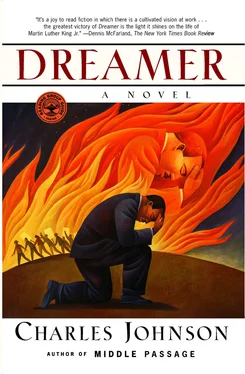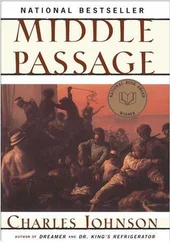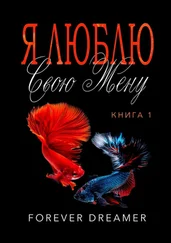Smith found this discovery of some of King’s sources, his borrowings, gratifying. Gleefully so. “You know, I always figured he couldn’t be as smart as he seems,” Smith said, yet I doubted he believed that. He was looking for faults, anything to reduce the minister’s stature and give himself room to breathe. But I wondered, as we examined King’s intellectual genesis and his Elizabethan borrowings, if the self we constructed was anything more than a fragile composite of other selves we’d encountered — a kind of epistemological salad — indebted to all spoken languages, all evolutionary forms, all lives that preceded our own, so that, when we spoke, it could be said, in the final analysis, subjectivity vanished and the world sang in every sentence we uttered. (And thus narrative was not a lie.) Added to that, and perhaps strangest of all, I noticed that as Smith pored over King’s speeches he at first resisted statements that contradicted his own experience of things — for example, the minister saying, “It is quite easy for me to think of the universe as basically friendly mainly because of my uplifting heredity and environmental circumstances.” In learning, there was an inescapable moment of alienation and displacement, a plunge into uncertainty and insecurity in the new, the other ; but then, miraculously, as he relaxed from resisting the revolution possible with each new perception, that interval of disorientation passed, and he found that no matter how far his mind had traveled, or how alien the data of knowledge might have seemed at first, he had in the end through these studies encountered only a dimension of himself.
After I worked with Smith all morning and afternoon on the broad themes and tropes in the ministers speeches, and the four levels of meaning in the Bible (literal, allegorical, tropological, and anagogic), and helped him design for himself a daily program of lectio divina, stretching the envelope of his mind and imagination, he enlisted Amy to work on his body. He knew, of course, exactly what he wanted from us. At the temple, Smith said, he’d learned to read Sanskrit in three days of study and chanting sutras. He asked Amy, who’d been a drama student, to help him with exercises to control the vocal centers — the abdomen, chest, lower and upper throat, and sinus cavity. He had me give him a close-to-the-skull haircut.
Then he proceeded to study, for fifty-minute intervals (as monks do with mandalas), and with all his senses imaginatively put into play, color photographs of Kings birth home (sold to Rev. Williams in 1909 for the price of $3,500) at 501 Auburn Avenue N.E. in Atlanta. With these pictures spread out before him on the farmhouse floor, he imaginatively climbed the four steps to the door and worked to feel everything in the images, bringing forth an emotional association for the umbrella box, high-backed chair, and table with a bouquet of flowers in the entryway; feel his way past the sliding doors to the piano with its low bench, which had one wobbly leg, the fireplace, the rocker, and different games — Old Maid and Monopoly — the King children played beside the old-fashioned radio in the parlor; feel himself walking the hardwood floors from the parlor to the tiny first-floor bathroom where Martin as a boy hid from his father’s switch and to avoid the unmanly chore of doing the dishes (he preferred to haul coal for the furnace to the cramped, low-ceilinged basement); he moved on to the kitchen with its Hossier cabinets and icebox containing a frozen block weighing ten pounds. From the kitchen window he worked to see the vacant lot the King children often played in and where once a year the circus, featuring clowns and acrobats and sweet cones of colored ice, threw up its tents. He ascended to the second floor, where he could view from the stairhead, one hand resting on the smooth railing, the window Martin used to leap from to impress girls passing by, and at age twelve hurled himself from with suicidal intent after hearing of “Mama” Jennie Williams’s fatal heart attack in 1941 when he had sneaked away to sin by going to the circus. He let his gaze travel to the guestroom (far left) set aside by King Senior for the endless stream of visiting ministers who stayed at their home; then on to his grandmother’s bedroom (there Martin was born), and next to that the boy’s playroom, where Tinkertoys, Lincoln Logs, coloring books, and Chinese checkers were scattered along the floor, and to feel too the height of the second-floor ceiling which Daddy King, who was only five-six, touched with his fingertips when he learned of Martin’s birth and literally jumped for joy. (Martin, we informed Smith, was originally named Michael King Jr. after his father, who was also christened Michael and then later, like his son, replaced that name with Martin.) We could see that this exercise was excruciating for Chaym Smith. He’d lived in an orphanage. On the streets. Each detail in the photos reinforced for him the staggering inequities of personal fortune. Little wonder that King leaned more toward optimism than pessimism about human nature. Toward the end of this session, as Smith came back downstairs and out to the front porch, giving himself a clear image of the German store down the street, owned by the father of Martin’s two best friends, and just across the street, over the neatly trimmed shrubs in the Kings’ yard, the shotgun shacks and alley apartments housing the black poor only fifty feet from Daddy King’s front door — at the end, Smith was shaken. He said, “I woulda given anything for a loving, decent childhood like that. Parents like that.” He peered up to me, but his eyes were still filled with all he’d seen. “Bishop, it ain’t right not having anybody who cared …”
Amy thought it best to put the photos away.
That night he slept longer than usual, his dreams peopled with King family principals. Loving folk such as Smith himself had never known. We did not wake him. He stumbled from his bedroom a little before noon, still bitter, but said, “What’re y’all staring at me for? Let’s get to work.” In Chicago, King had given us several articles of his clothing: pointed black shoes, a shirt from Zimmerman’s in Atlanta, black shin-high nylon socks, a brown passport holder bearing the inscription CITY OF LONDON, HOUSE OF PARLIAMENT, and Ruskin’s book Unto This Last . These I gave to Smith. The clothing was a near-perfect fit. After a light lunch, he turned to copying lines from one of King’s recorded speeches, “A Knock at Midnight,” isolating the metaphoric logic behind the comparisons King drew, some of which Smith found severely wanting in poetic value (“the cataract of sin,” “the virus of pride”); he sneered, “I can do better than that,” then plunged on to scan passages (“Not only is it midnight in man’s collective life but it’s midnight in his individual life, it’s midnight in the psychological order …”) so his emphasis would vary as little as possible from the original.
To his credit and our incredulity, he absorbed the information we fed him like a sponge. But then again, the task was not as daunting as it might seem, given his long, painful twelve-year obsession with the nation’s most prominent preacher, and his own unusual gifts. Little by little, he learned that if there was a single philosophical law to the minister’s life, an essence, it was embodied in three profound ideals. First, the deeper meaning of nonviolence, not merely as a strategy for protest, but as a Way, a daily praxis men must strive to translate into each and every one of their deeds. This Smith understood and compared to the Sanskrit word ahimsa, from himsa (“to injure”) and a (“no” or “not”), so that in its fullness King’s moral stance implied noninjury to everything that exists. Second, agape, the ability to love something not for what it presently was (which might be quite unlovable, like George Wallace) but for what it could be, a teleological love that recognized everything as process, not product, and saw beneath the surface to a thing’s potentiality. And last, the fact of integration as the life’s blood of Being itself. As I explained this to Smith, it struck me that these were not separate ideals at all, only different sides of a single meditation nearly as old as humanity, a meditation that could be lapped and folded in as few as three words:
Читать дальше












